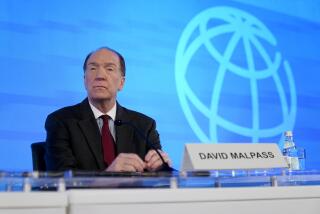Head of World Bank Preparing to Retire
- Share via
World Bank President James Wolfensohn said he expected to leave his job after his term expired in June.
“I’ve had 10 years, and I think that’s probably enough,” Wolfensohn, 71, said on ABC’s “This Week” show Sunday. “But if the need is there, I’ll do whatever the shareholders want. My understanding and my belief is that probably during the course of this year, I’ll give over to someone else.”
President Bush is likely to push ahead with plans this year to narrow the focus of the World Bank, analysts said, returning the international lending institution to its roots of primarily financing large infrastructure projects and doing away with the practice of handing out interest-free loans.
The lender, the largest financier of projects in developing nations, broadened its scope under Wolfensohn, who sought a more “humanizing” role for the bank. Since taking over in 1995, he cut by 40% financing for dams, bridges and infrastructure projects, and shifted that money to programs promoting climate change, faith-based initiatives and helping the disabled.
“The magnitude of the change was really very significant,” said former World Bank Chief Economist Joseph Stiglitz, a 2001 Nobel Prize winner. “He saw development in human terms. It wasn’t just a bank, it was the impact that the World Bank had on the lives of individuals.”
Bush is seeking to scale back some of Wolfensohn’s projects, overhaul the bank’s $20-billion-a-year lending operation and taper a roster of more than 10,000 employees in 109 nations, Carnegie Mellon University economist Allan Meltzer said.
“The Wolfensohn era is over,” said Meltzer, who led a congressional commission evaluating the bank’s performance in 2000. “I don’t think that his way of going about economic development fit with the Bush administration.”
By tradition, the U.S. president appoints the head of the World Bank, and the head of the bank’s sister institution, the International Monetary Fund, is named by European officials. A White House spokesman couldn’t immediately comment Sunday on the outlook for Wolfensohn’s tenure.
World Bank lending for large-scale projects to build power plants, roads and other public works dropped to $5.5 billion in 2002 from $9.5 billion in 1993, according to the lender’s website, as Wolfensohn focused on more human interest projects.
Critics want the bank to get back to its roots of financing infrastructure, saying Wolfensohn’s projects have shown little, if any, returns for the bank.
More to Read
Inside the business of entertainment
The Wide Shot brings you news, analysis and insights on everything from streaming wars to production — and what it all means for the future.
You may occasionally receive promotional content from the Los Angeles Times.










